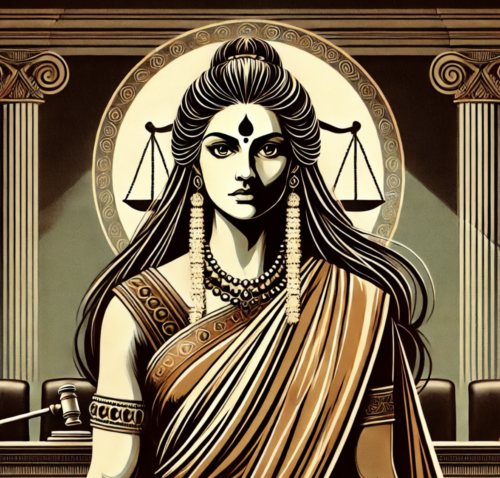The Mahabharata, one of India’s greatest epics, is more than a story of kings, wars, and familial conflicts. It serves as a profound exploration of human nature, societal structures, and moral dilemmas, offering lessons that are still relevant today. Among its many themes, the Mahabharata provides critical insights into gender equality and justice, highlighting the roles, challenges, and strengths of women in a predominantly patriarchal society. These lessons remain valuable for understanding and addressing gender issues in the modern world.
The tale of Draupadi, one of the central characters in the Mahabharata, stands as a powerful narrative of resilience and justice. Draupadi, a woman of extraordinary courage, intelligence, and dignity, faced tremendous injustices, including her public humiliation during the infamous dice game. Her refusal to remain silent and her demand for accountability challenged the deeply entrenched norms of her time. Draupadi’s story inspires us to confront societal injustices, advocate for equal rights, and ensure that women’s voices are heard and respected in all spheres of life.
Kunti, the mother of the Pandavas, exemplifies the emotional strength and wisdom often required of women in challenging situations. As a widow, she navigated complex family dynamics and ensured her sons were united in their goals. Her life teaches us about the often-overlooked contributions of women in maintaining familial harmony and the importance of empowering women to take leadership roles within their families and communities.
The Mahabharata also portrays the challenges faced by women like Amba, whose life was marked by injustice and societal expectations. Amba’s struggle to reclaim her dignity after being wronged reflects the ongoing fight for women’s rights and justice in modern times. Her story is a reminder of the need to address systemic biases and create environments where women are treated with fairness and respect.
Beyond individual characters, the Mahabharata highlights the importance of collective respect and justice for women. For instance, the tragic consequences of Draupadi’s disrobing and the Kauravas’ failure to defend her honor emphasize the societal cost of gender-based injustices. These narratives call for the creation of systems and policies that uphold the dignity and rights of women, ensuring that no one is subjected to humiliation or exploitation.
In today’s world, the lessons from the Mahabharata resonate strongly. Women across the globe continue to face discrimination, harassment, and systemic inequities. The epic reminds us of the importance of standing against such injustices and fostering a culture of equality, respect, and empowerment.
Achieving gender equality requires collaborative efforts, including educating communities, promoting awareness, and creating supportive legal frameworks. The Mahabharata, with its emphasis on justice and fairness, encourages us to challenge outdated norms and embrace progressive values that promote inclusivity and respect.
Key Action Points for Advancing Gender Equality
Provide platforms and safe spaces where women can express their concerns without fear, fostering a culture of openness and dialogue.
Actively confront and dismantle stereotypes and systemic biases in workplaces, schools, and communities to promote inclusivity.
Empower women by opening pathways for leadership roles in businesses, politics, and community organizations.
Advocate for strong legal frameworks and enforcement mechanisms to safeguard women against harassment, violence, and exploitation.
Promote family and community awareness about equality and mutual respect in relationships to create harmonious societies.
Provide platforms and safe spaces where women can express their concerns without fear, fostering a culture of openness and dialogue.
Implement gender equality education in schools and public campaigns to instill values of equity and respect from an early age.
Build partnerships among governments, NGOs, and private sectors to implement systemic changes that drive gender equality forward.
Ensure justice is served promptly and fairly by holding perpetrators of gender-based offenses accountable.
Share inspiring stories of modern women leaders and changemakers to motivate others and showcase the impact of gender equality.
Facilitate conversations across genders to promote mutual respect and understanding, helping to break down barriers to equality.
Conclusion
the Mahabharata’s timeless lessons on gender equality and justice provide valuable guidance for modern society. By learning from the stories of Draupadi, Kunti, Amba, and other remarkable women in the epic, we can work towards a world where fairness and respect are not ideals but realities. As we strive for a more equitable future, the Mahabharata serves as a reminder that justice and equality are not just societal goals but moral imperatives.
Stay connected with us at www.theknowledgenexus.in for more profound insights, timeless wisdom, and practical lessons
Disclaimer:
The content on this website is intended for informational purposes only, offering insights derived from the Mahabharata, Ramayana, and Bhagavad Gita. Interpretations may vary as these are deeply subjective matters and may be viewed differently across cultures and perspectives.






One thought on “Achieving Gender Equality and Justice through Timeless Lessons from the Mahabharata”